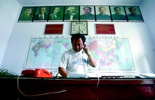From china.org.cn, via China Elections and Governance:
Wu Zhengen goes about his work as he always does. The deputy Party secretary of the fourth production team of Zhoujiazhuang Township in Jinzhou City, Hebei Province, is busy in his office, making phone calls to his team members to confirm their work assignments. Mounted on the wall behind his desk are a map of the world, a quartz clock flanked by two glass frames, and pictures of Communism’s eight leading figures: Marx, Engles, Lenin, Stalin, Mao Zedong, Liu Shaoqi, Zhou Enlai and Zhu De.
Liang Jianzhong, head of the fourth production team, is not accustomed to the concept of “independent work”. “All the work schedules and assignments are arranged by me,” he said. At six o’clock every morning, Liang speaks through a loudspeaker, telling the members of his team who is to do what that day.
Here in Zhoujiazhuang, China’s last people’s commune, all the land and labor is owned by the township. Such obsolete terms as “work points or scores” and “grain rations”, used during the planned economy era, are still very much a part of the village life in Zhoujiazhuang. [Full text]








